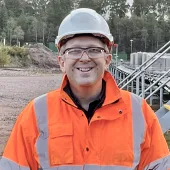Moving into a New Era

IQ and MPQC relocate to new state-of-the-art offices in Chilwell on the outskirts of Nottingham
After 38 years of occupation at 7 Regent Street, Nottingham, Institute of Quarrying staff spent most of the week before the August Bank Holiday, packing up for their move to a new 3,000ft2 office building in Chilwell on the outskirts of Nottingham.
With so much happening within IQ at present, moving to Chilwell, along with sister organization MPQC, marks an exciting new chapter for both organizations. The Institute’s purchase of McPherson House (named in honour of Simon McPherson, the founder of IQ) at Chetwynd Business Park was completed in July at a cost of £400,000 and a further £140,000 has since been invested in the fit-out of the building.
The new two-storey building features spacious offices, meeting/training rooms, storage space and kitchen areas, together with the associated desks, tables, chairs, computers and high-tech audio-visual equipment. More importantly, the state-of-the-art office, as Phil James, executive director of IQ and MPQC described, will hopefully create a new industry ‘meeting hub’ for education, training, seminars and teleconferences.
‘As well as having a much better working environment in place, it was absolutely crucial that we got the location right and Chilwell was chosen as the most strategic location for McPherson House,’ he told QM. ‘We’re based only 5 miles from Nottingham city centre (south west of the city) and the office is conveniently close to J25 M1, East Midlands Airport and three mainline rail links.
‘We also made the deliberate decision to stay in the East Midlands region because there is a lot of related activity in the area, especially the quarrying side of the industry – for example – many of the majors still have their headquarters in this area. There is also a large number of quarrying firms, plant operators and training organizations operating across the region.’
The inauguration of McPherson House took place on 9 October during the morning before the Council meeting and AGM. As part of the ceremony, Martin Isles, IQ president, gave a brief presentation on the history of the Institute from its inception in October 1917 to date. And to commemorate the event, a plaque made of Welsh slate – to provide a link with the Institute’s birthplace of Caernarfon – was unveiled by Simon McPherson’s granddaughter, Mrs Julia Ayres.
The ground floor of the office building (occupied by IQ) houses a large fully equipped meeting room, providing seating for up to 26 people. It can also be used as a 40-seat lecture theatre for training sessions, presentations, seminars etc. Other IQ facilities include a smaller meeting room, archive storeroom and kitchen. The first floor (occupied by MPQC staff) features no less than six offices providing enough space for both IQ and MPQC to expand in the future.
‘We are all delighted with the facilities at McPherson House,’ enthused Phil. ‘They are new, modern and flexible, which will help us support the needs of our members and clients. The new office represents not only a significant investment but also a major asset for the Institute. We want the building to be fully utilized and shared by the wider quarrying industry, so it’s important that McPherson House is seen as the main hub for the industry to get together and make key decisions from this excellent base.’
Phil gives every impression that he is enjoying life at the helm and the challenges that lie ahead. Before taking over the reins as new executive director of IQ and MPQC, he was assistant chief officer at the British Association of Social Workers, following a seven-year period as regional director of the Chartered Institute of Building.
‘Having graduated with a degree in construction management and spending the early part of my career as a quarry manager with RMC (now CEMEX), joining IQ feels very much like coming home,’ said Phil. ‘The new office move to Chilwell and the management restructure at the Institute and MPQC represents a new era for both organizations. However, as we look to build on the future of IQ and MPQC, it is very important that we hold on to our traditional roots and remember who we are and where we came from.
‘We currently live in a globalized society and there seems to be no getting away from sophisticated technology – for example – smartphones and apps have really taken off in the last few years. With this in mind, I think there is a need and appetite for IQ to embrace new technologies and perhaps seek new ways of how we operate, communicate and organize events in order for the organization to grow and develop. That said, members must be empowered to use such devices that suits them.’
Phil might sound tech-savvy but he still fully supports and appreciates the effort and enthusiasm that members put into their branch activities, ensuring that high-quality CPD and face-to-face networking are available to professional colleagues across the industry. ‘We have to build on our past and not disregard our traditions,’ he continued. ‘Supporting this effort and sustaining this enthusiasm is key to the future success of IQ, ensuring that it remains relevant to and in touch with its members.’
Led by Phil, the recent management changes within IQ and MPQC are intended to drive growth and strengthen the operations and activities of both organizations. He will be supported by Helen Hewitt, who joined MPQC in September 2012 as general manager of the Skills Centre (a role previously carried out by Julian Smallshaw on a part-time basis). She carries a wealth of experience from the skills sector, having previously worked as the industry lead for the extractives, mineral processing and timber sectors at Proskills.
‘I am delighted with Helen’s appointment. She is a highly valuable member of the new MPQC management team, bringing an abundance of energy and enthusiasm to the body with a more focused and commercial emphasis,’ explained Phil.
Commenting on her role, Helen said: ‘I’ll be looking to work with employers to ensure the provision of training offered by MPQC is relevant, up to date, fit for purpose and what the industry needs.’
As the new Standards Setting Organization (SSO) for the extractives and mineral products sectors, MPQC will represents its industries’ interests to government and other key agencies in all matters related to education, training and qualifications. Helen added: ‘Our Training and Education Committee – made up of employers, training providers, trade associations and other stakeholders – will work directly with businesses and MPQC’s Awarding Organisation division to forecast the skills needs of the industry and look at ways of developing new courses as and when they are needed.’
Roseanne Hayward will continue in her role as general manager of MPQC’s Awarding Organisation division, encompassing her statutory position as responsible officer to Ofqual. ‘With the new SSO status, we have an even more important role to play in helping the industry’s commitment to delivering a fully competent workforce at all levels,’ she commented. ‘MPQC will provide qualifications based on National Occupational Standards, ensuring the development of, and access to, high-quality sector-specific education, training and qualifications.’
Meanwhile, Julian Smallshaw, who previously headed the Skills Centre, has been appointed to the newly created position of MPQC/IQ business development manager. Reporting to Phil James, Julian will focus on delivering a new marketing and sales strategy for MPQC and the Institute, taking a holistic approach to skills/qualifications development and relationship building on behalf of both organizations.
Mike Phillips will continue in his role as IQ general manager, overseeing the day-to-day running of the Institute, as well as building on the success of its Corporate Professional Competence (CPC) scheme for mineral site operators and contractors.
Looking ahead, Phil James hopes to achieve major growth and acquire new commercial opportunities for both IQ and MPQC. The current economic climate has proven tough for many businesses in the quarrying industry – and one of Phil’s key strategic objectives is to focus on strengthening the brands of the two organizations in this increasingly challenging environment.
‘I want both bodies to be instantly recognized as strong and reliable brands in the industry, creating a set of expectations for people to know that they are receiving a consistently high-quality product or service,’ he explained. ‘I’d like to see IQ members be genuinely proud of their association with the Institute, and for MPQC to be the first port of call for training and education excellence – synonymous with professional competence within the sector.'








